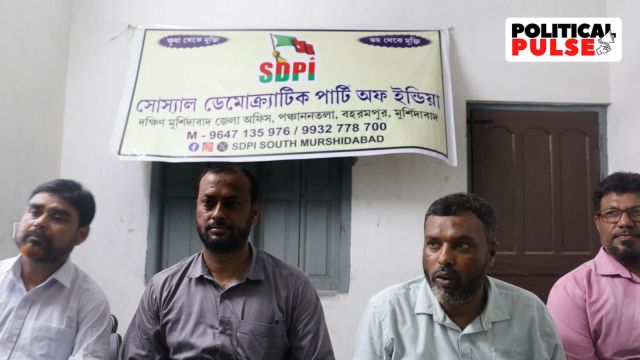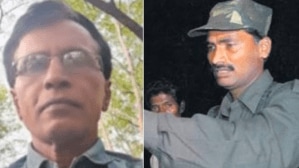At his house, which also doubles up as his chamber, Mir Hasnat Ali chaired a meeting of the Swadhikar Raksha Mancha (Platform for Defending Freedom) on April 21.
Ali, who practises homoeopathy, is the president of the outfit based in Baharampur in West Bengal’s Murshidabad district. The meeting saw organisations as varied as the CPI(ML) Liberation and the Social Democratic Party of India (SDPI) in attendance, with the participants discussing plans for a rally in Baharampur the following week. But that night, senior police officers turned up at Ali’s home to convince him to drop the plan.

The Swadhikar Raksha Mancha has been campaigning against the Waqf (Amendment) Act, 2005, and the police were concerned that their rally might further inflame the situation. On April 11, violence had gripped Murshidabad’s Jangipur area amid protests against the amended Waqf law, leaving a father and his son dead. While the BJP accused the SDPI of playing a role in the violence, the police have not yet booked anyone from the party.
Story continues below this ad
“The SDPI is responsible. But it is not alone. Several other Muslim organisations in the area are responsible for the violence. It was a pre-planned move,” alleged BJP’s Jangipur organisational district president Subal Chandra Ghosh.
“During the Left Front’s rule, Bengal was a safe passage (for terrorists and fundamentalists). Under Trinamool Congress (TMC) rule, it has become a safe home due to appeasement politics. Hate speech against a community was heard not only in Murshidabad but in areas just 12 km from Kolkata. The police heard it but remained silent. What is sad is that even boys as young as 12 and 17 years old are being brainwashed and indoctrinated. They are throwing stones,” said BJP’s Rajya Sabha MP Samik Bhattacharya.
What is SDPI?
The SDPI, formed in Delhi in 2009, is alleged to be the political wing of the Popular Front of India (PFI), but nowadays it denies any links with the banned outfit. It has a major presence in some southern states, especially Kerala, and, unlike the PFI, has Dalits as well as Muslims in its ranks.
On April 22, while Ali met Murshidabad SP Surya Pratap Yadav, members of a 20-strong Special Investigation Team (SIT) of West Bengal Police, set up to probe the violence, visited an abandoned SDPI office in Samserganj’s Babupur village.
Story continues below this ad
“From 9 pm to 11 pm (on April 21), the police tried to convince me to withdraw the rally, saying there are chances that peace will be disturbed. The next day, after the SP requested me, I had to drop the plans for the rally,” said Ali.
“Some sections are pointing fingers at us after the recent violence in Jangipur, but it is 100% false, show me the proof,” said SDPI state secretary and its Murshidabad Uttar branch president Masud-ul Islam, who was among those present at the meeting in Ali’s home. “The Waqf Act protest is a constitutional issue for us, and we have conducted public meetings and rallies. But we were not present at the rallies on April 11 that turned violent. Yes, we are against the Act, but we do not believe in violence. We organise all our programmes with prior police permission.”
Marginal force
SDPI leaders said their party initially had a presence in the districts of Kolkata, South 24 Parganas. Malda, and Murshidabad, but now has an organisational structure in eight more districts, including Howrah, Birbhum, Hooghly, Jalpaiguri, Coochbehar, and Uttar Dinajpur. Murshidabad, they said, had always been one of the places where the party had a strong base, at least enough to contest elections. According to them, the SDPI is not an outside force that some are making it out to be.
“In the last Lok Sabha polls, we contested all three seats in Murshidabad district — Baharampur, Murshidabad, and Jangipur — but lost. In the 2026 Assembly polls, we plan to contest five seats in Murshidabad: Raninagar, Sagardighi, Samserganj, Lalgola, and Raghunathganj. Of the 22 Assembly seats (in the district), we have an organisation in 15. We have around 5,000 active members here,” said Islam.
Story continues below this ad
On the party’s position on the Waqf Act, SDPI’s Murshidabad district committee member Asif Sheikh said, “We are against the Waqf Act. The BJP-led Central government has been trying to destroy the Muslim community, bringing in one law after another. It brought a law against triple talaq, then the Citizenship Amendment Act, and now the Waqf Act. That is why we are protesting, and the people are with us.”
His party colleague and SDPI’s district secretary Shafiqul Rehman said, “If anyone is to blame, it is the BJP. Moreover, the rhetoric of Bengal BJP leaders such as Suvendu Adhikari and others has infuriated Muslims and the downtrodden. The BJP carried arms during their Ram Navami rally, while we protested peacefully against the Waqf law.”
Though the SDPI claims to have an 8,000 to 10,000-strong cadre across the state and has contested a few seats in the last few Assembly polls, its impact on West Bengal politics has been negligible. Since the decline of the Left, the TMC has been the party of choice of most Muslims in the state.
Shadow of PFI
Despite the denials, the SDPI has struggled to get out of the shadow of the PFI, an outfit banned under Section 3 of the Unlawful Activities (Prevention) Act of 1967. In March, the Enforcement Directorate raided the SDPI’s offices in 12 places across India, including its state headquarters in Kolkata’s Mullickbazar area, following the arrest of the party’s national president M K Faizy in a money laundering probe against the PFI.
Story continues below this ad
“We are a political party with no relation to the PFI,” said SDPI’s state vice-president and national secretary Tahedul Islam. “There may be some PFI members in the party, but, since the ban, we do not accept anyone from that organisation. The ED conducted raids, but they found nothing. It was a way to terrorise us, but we are not scared.”
Tahedul said that with the Supreme Court looking into the Waqf issue, the party had decided not to hold any public rallies on the matter. “Our party has filed a petition with the Supreme Court, and we are looking up to the judiciary to do justice. We are, instead, organising small indoor meetings where we are telling people about the law and how it is detrimental to Muslims. We are against violent protests, and we are telling people not to take the law into their hands,” he said.
The SDPI leader said what happened in Murshidabad was unfortunate and a proper investigation would “reveal the truth”.

































